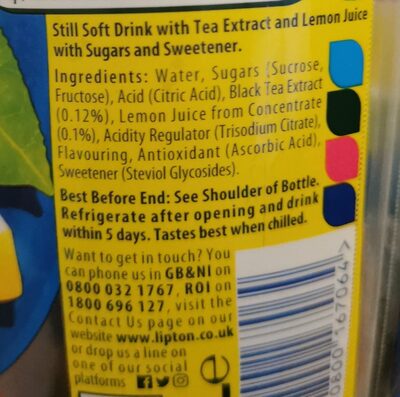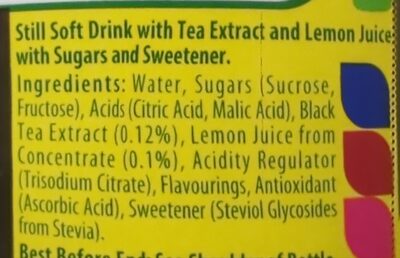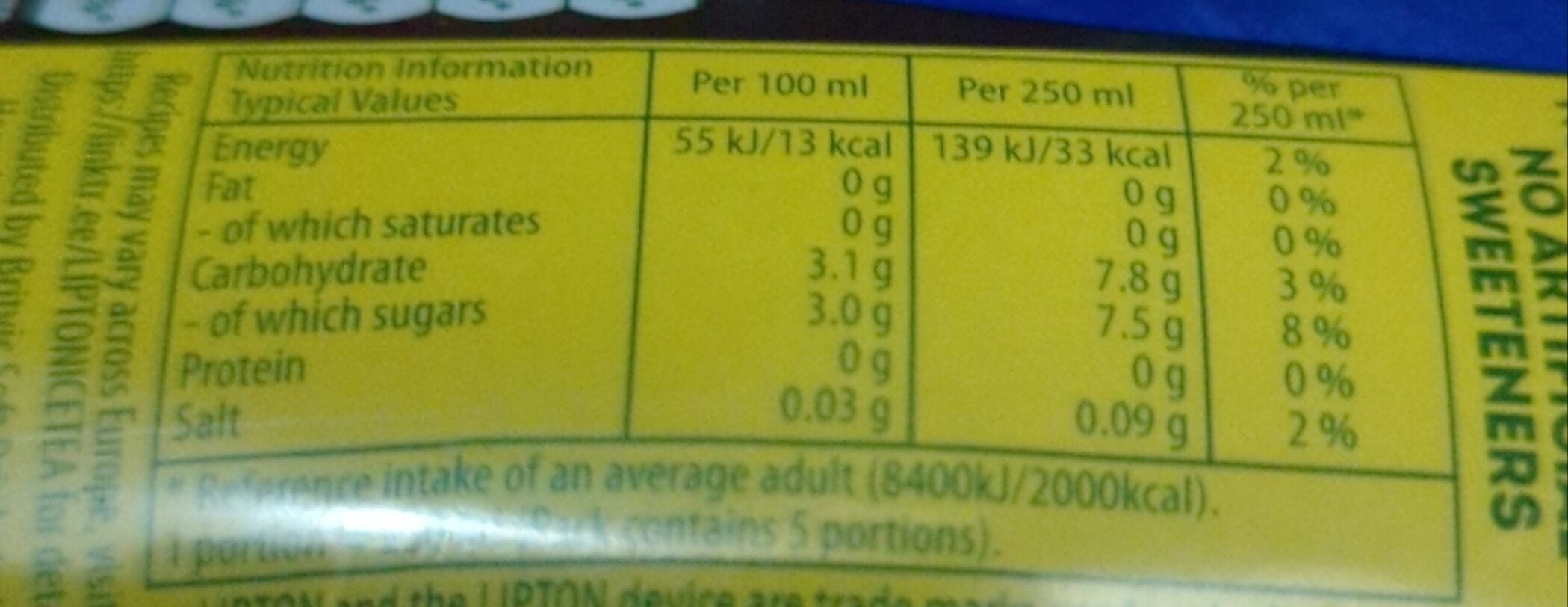Help us make food transparency the norm!
As a non-profit organization, we depend on your donations to continue informing consumers around the world about what they eat.
The food revolution starts with you!
Lemon Ice Tea - Lipton
Lemon Ice Tea - Lipton
This product page is not complete. You can help to complete it by editing it and adding more data from the photos we have, or by taking more photos using the app for Android or iPhone/iPad. Thank you!
×
Barcode: 4060800167064 (EAN / EAN-13)
Packaging: en:Hdpe-cap, en:Pet-bottle
Brands: Lipton
Categories: en:Beverages, en:Tea-based beverages, en:Iced teas, en:Lemon flavored iced teas
Countries where sold: An Rìoghachd Aonaichte
Matching with your preferences
Health
Ingredients
-
16 ingredients
Beurla: Water, Sugars (Sucrose, Fructose), Acids (Citric Acid, Malic Acid), Black Tea Extract (0.12%), Lemon Juice from Concentrate (0.1%), Acidity Regulator (Trisodium Citrate), Flavourings, Antioxidant (Ascorbic Acid), Sweetener (Steviol Glycosides from Stevia).
Food processing
-
Ultra processed foods
Elements that indicate the product is in the en:4 - Ultra processed food and drink products group:
- Ingredient: Flavouring
- Ingredient: Sweetener
Food products are classified into 4 groups according to their degree of processing:
- Unprocessed or minimally processed foods
- Processed culinary ingredients
- Processed foods
- Ultra processed foods
The determination of the group is based on the category of the product and on the ingredients it contains.
Additives
-
E296
Malic acid: Malic acid is an organic compound with the molecular formula C4H6O5. It is a dicarboxylic acid that is made by all living organisms, contributes to the pleasantly sour taste of fruits, and is used as a food additive. Malic acid has two stereoisomeric forms -L- and D-enantiomers-, though only the L-isomer exists naturally. The salts and esters of malic acid are known as malates. The malate anion is an intermediate in the citric acid cycle.Source: Wikipedia (Beurla)
-
E330
Citric acid: Citric acid is a weak organic acid that has the chemical formula C6H8O7. It occurs naturally in citrus fruits. In biochemistry, it is an intermediate in the citric acid cycle, which occurs in the metabolism of all aerobic organisms. More than a million tons of citric acid are manufactured every year. It is used widely as an acidifier, as a flavoring and chelating agent.A citrate is a derivative of citric acid; that is, the salts, esters, and the polyatomic anion found in solution. An example of the former, a salt is trisodium citrate; an ester is triethyl citrate. When part of a salt, the formula of the citrate ion is written as C6H5O3−7 or C3H5O-COO-3−3.Source: Wikipedia (Beurla)
-
E331
Sodium citrate: Sodium citrate may refer to any of the sodium salts of citrate -though most commonly the third-: Monosodium citrate Disodium citrate Trisodium citrateThe three forms of the salt are collectively known by the E number E331. Sodium citrates are used as acidity regulators in food and drinks, and also as emulsifiers for oils. They enable cheeses to melt without becoming greasy.Source: Wikipedia (Beurla)
-
E331iii
Sodium citrate: Sodium citrate may refer to any of the sodium salts of citrate -though most commonly the third-: Monosodium citrate Disodium citrate Trisodium citrateThe three forms of the salt are collectively known by the E number E331. Sodium citrates are used as acidity regulators in food and drinks, and also as emulsifiers for oils. They enable cheeses to melt without becoming greasy.Source: Wikipedia (Beurla)
Ingredients analysis
-
en:Palm oil free
No ingredients containing palm oil detected
-
en:Maybe vegan
Ingredients that may not be vegan: en:Flavouring
-
en:Maybe vegetarian
Ingredients that may not be vegetarian: en:Flavouring
-
Details of the analysis of the ingredients
en: Water, Sugars (Sucrose, Fructose), Acids (Citric Acid, Malic Acid), Black Tea Extract 0.12%, Lemon Juice from Concentrate 0.1%, Acidity Regulator (Trisodium Citrate), Flavourings, Antioxidant (Ascorbic Acid), Sweetener (Steviol Glycosides from Stevia)- Water -> en:water - vegan: yes - vegetarian: yes - ciqual_food_code: 18066 - percent_min: 93.38 - percent_max: 99.54
- Sugars -> en:sugar - vegan: yes - vegetarian: yes - ciqual_proxy_food_code: 31016 - percent_min: 0.12 - percent_max: 3
- Sucrose -> en:sucrose - vegan: yes - vegetarian: yes - ciqual_proxy_food_code: 31016 - percent_min: 0 - percent_max: 3
- Fructose -> en:fructose - vegan: yes - vegetarian: yes - ciqual_food_code: 31077 - percent_min: 0 - percent_max: 1.5
- Acids -> en:acid - percent_min: 0.12 - percent_max: 3
- Citric Acid -> en:e330 - vegan: yes - vegetarian: yes - percent_min: 0 - percent_max: 3
- Malic Acid -> en:e296 - vegan: yes - vegetarian: yes - percent_min: 0 - percent_max: 1.5
- Black Tea Extract -> en:black-tea-extract - vegan: yes - vegetarian: yes - ciqual_food_code: 18154 - percent_min: 0.12 - percent: 0.12 - percent_max: 0.12
- Lemon Juice from Concentrate -> en:lemon-juice-from-concentrate - vegan: yes - vegetarian: yes - ciqual_food_code: 2028 - percent_min: 0.1 - percent: 0.1 - percent_max: 0.1
- Acidity Regulator -> en:acidity-regulator - percent_min: 0 - percent_max: 0.1
- Trisodium Citrate -> en:e331iii - vegan: yes - vegetarian: yes - percent_min: 0 - percent_max: 0.1
- Flavourings -> en:flavouring - vegan: maybe - vegetarian: maybe - percent_min: 0 - percent_max: 0.1
- Antioxidant -> en:antioxidant - percent_min: 0 - percent_max: 0.1
- Ascorbic Acid -> en:e300 - vegan: yes - vegetarian: yes - percent_min: 0 - percent_max: 0.1
- Sweetener -> en:sweetener - percent_min: 0 - percent_max: 0.1
- Steviol Glycosides from Stevia -> en:e960a - vegan: yes - vegetarian: yes - percent_min: 0 - percent_max: 0.1
Nutrition
-
Average nutritional quality
⚠ ️Warning: the amount of fruits, vegetables and nuts is not specified on the label, it was estimated from the list of ingredients: 0This product is considered a beverage for the calculation of the Nutri-Score.
Positive points: 0
- Proteins: 0 / 5 (value: 0, rounded value: 0)
- Fiber: 0 / 5 (value: 0, rounded value: 0)
- Fruits, vegetables, nuts, and colza/walnut/olive oils: 0 / 10 (value: 0.1, rounded value: 0.1)
Negative points: 4
- Energy: 2 / 10 (value: 55, rounded value: 55)
- Sugars: 2 / 10 (value: 3, rounded value: 3)
- Saturated fat: 0 / 10 (value: 0, rounded value: 0)
- Sodium: 0 / 10 (value: 12, rounded value: 12)
The points for proteins are counted because the negative points are less than 11.
Nutritional score: (4 - 0)
Nutri-Score:
-
Nutrient levels
-
Fat in low quantity (0%)
What you need to know- A high consumption of fat, especially saturated fats, can raise cholesterol, which increases the risk of heart diseases.
Recommendation: Limit the consumption of fat and saturated fat- Choose products with lower fat and saturated fat content.
-
Saturated fat in low quantity (0%)
What you need to know- A high consumption of fat, especially saturated fats, can raise cholesterol, which increases the risk of heart diseases.
Recommendation: Limit the consumption of fat and saturated fat- Choose products with lower fat and saturated fat content.
-
Siùcar in moderate quantity (3%)
What you need to know- A high consumption of sugar can cause weight gain and tooth decay. It also augments the risk of type 2 diabetes and cardio-vascular diseases.
Recommendation: Limit the consumption of sugar and sugary drinks- Sugary drinks (such as sodas, fruit beverages, and fruit juices and nectars) should be limited as much as possible (no more than 1 glass a day).
- Choose products with lower sugar content and reduce the consumption of products with added sugars.
-
Salann in low quantity (0.03%)
What you need to know- A high consumption of salt (or sodium) can cause raised blood pressure, which can increase the risk of heart disease and stroke.
- Many people who have high blood pressure do not know it, as there are often no symptoms.
- Most people consume too much salt (on average 9 to 12 grams per day), around twice the recommended maximum level of intake.
Recommendation: Limit the consumption of salt and salted food- Reduce the quantity of salt used when cooking, and don't salt again at the table.
- Limit the consumption of salty snacks and choose products with lower salt content.
-
-
Nutrition facts
Nutrition facts As sold
for 100 g / 100 mlAs sold
per serving (250 ml)Compared to: en:Iced teas Lùth 55 kj
(13 kcal)138 kj
(32 kcal)-35% Fat 0 g 0 g -100% Saturated fat 0 g 0 g -100% Carbohydrates 3.1 g 7.75 g -35% Siùcar 3 g 7.5 g -26% Fiber 0 g 0 g -100% Proteins 0 g 0 g -100% Salann 0.03 g 0.075 g +3% Fruits‚ vegetables‚ nuts and rapeseed‚ walnut and olive oils (estimate from ingredients list analysis) 0.1 % 0.1 %
Environment
-
Eco-Score C - Moderate environmental impact
The Eco-Score is an experimental score that summarizes the environmental impacts of food products.→ The Eco-Score was initially developped for France and it is being extended to other European countries. The Eco-Score formula is subject to change as it is regularly improved to make it more precise and better suited to each country.Life cycle analysis
-
Average impact of products of the same category: B (Score: 63/100)
Category: Still soft drink with tea extract, with sugar and artificial sweetener(s)
Category: Still soft drink with tea extract, with sugar and artificial sweetener(s)
- PEF environmental score: 0.10 (the lower the score, the lower the impact)
- including impact on climate change: 0.52 kg CO2 eq/kg of product
Stage Impact Agriculture
34.3 %Processing
1.3 %Packaging
38.3 %Transportation
14.8 %Distribution
8.8 %Consumption
2.4 %
Bonuses and maluses
-
Missing origins of ingredients information
Malus: -5
⚠ ️ The origins of the ingredients of this product are not indicated.
If they are indicated on the packaging, you can modify the product sheet and add them.
If you are the manufacturer of this product, you can send us the information with our free platform for producers.
-
Packaging with a medium impact
Malus: -6
Shape Material Recycling Impact Bottle PET Medium Bottle cap HDPE Medium
Eco-Score for this product
-
Impact for this product: C (Score: 52/100)
Product: Lemon Ice Tea - Lipton
Life cycle analysis score: 63
Sum of bonuses and maluses: -11
Final score: 52/100
-
Carbon footprint
-
Equal to driving 0.3 km in a petrol car
52 g CO² per 100g of product
The carbon emission figure comes from ADEME's Agribalyse database, for the category: Still soft drink with tea extract, with sugar and artificial sweetener(s) (Source: ADEME Agribalyse Database)
Stage Impact Agriculture
19.2 %Processing
2.4 %Packaging
34.0 %Transportation
36.4 %Distribution
6.8 %Consumption
1.3 %
Packaging
-
Packaging with a medium impact
-
Packaging parts
Bottle (PET)
Bottle cap (HDPE)
-
Packaging materials
Material % Packaging weight Plastic
-
Transportation
-
Origins of ingredients
Missing origins of ingredients information
⚠ ️ The origins of the ingredients of this product are not indicated.
If they are indicated on the packaging, you can modify the product sheet and add them.
If you are the manufacturer of this product, you can send us the information with our free platform for producers.Add the origins of ingredients for this product Add the origins of ingredients for this product
Report a problem
-
Incomplete or incorrect information?
Category, labels, ingredients, allergens, nutritional information, photos etc.
If the information does not match the information on the packaging, please complete or correct it. Open Food Facts is a collaborative database, and every contribution is useful for all.
Data sources
Product added on by swipe-studio
Last edit of product page on by alexratman.
Product page also edited by inf, packbot.










